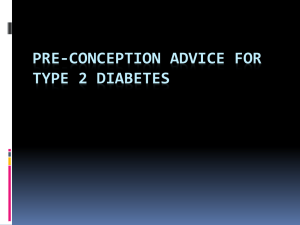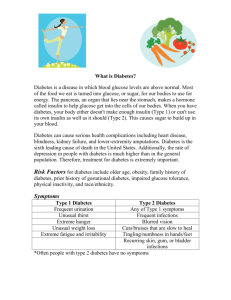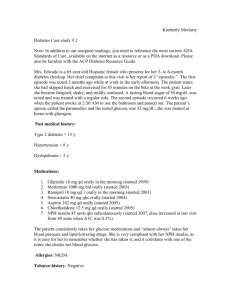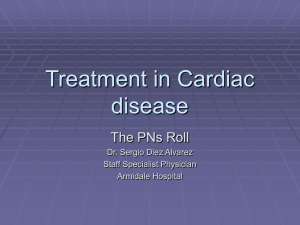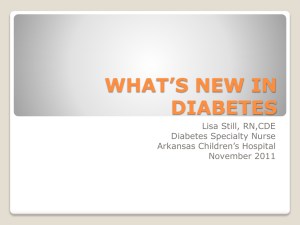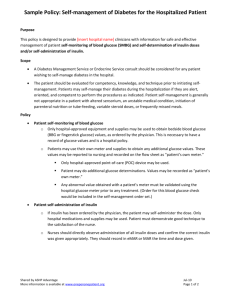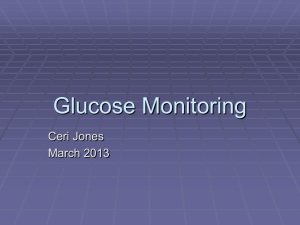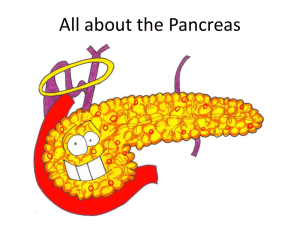Pediatric Diabetes
advertisement
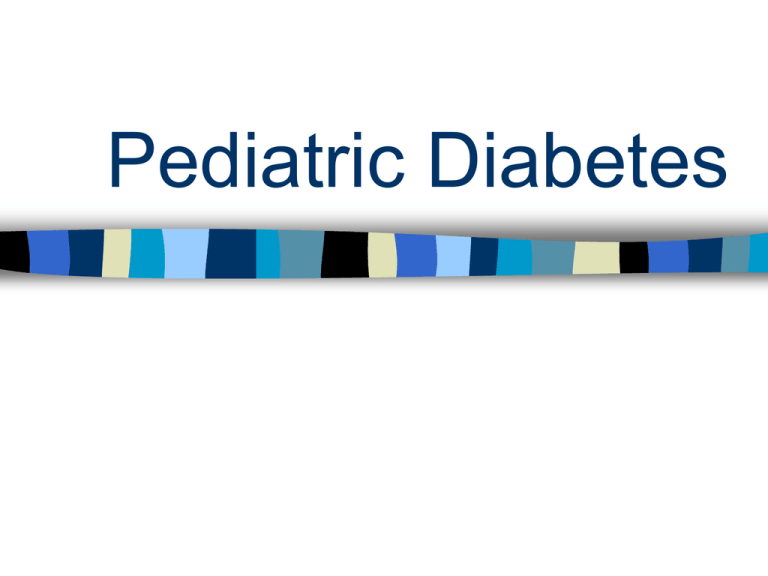
Pediatric Diabetes Type 1 Diabetes Occurs in about 1 in 500-600 children Results from autoimmune destruction of pancreatic cells that produce insulin, resulting in permanent insulin deficiency Insulin regulates glucose metabolism, which is essential for growth, activity, wound healing, and brain function Type 2 Diabetes Rather than insulin deficiency, insulin resistance occurs in T2, impairing cellular uptake of insulin This can eventually lead total destruction of pancreatic cells and thus insulin deficiency Blood Glucose Level As a result of insulin deficiency, blood glucose levels often deviate from normal range, resulting in… – Hyperglycemia (high blood glucose level) • • • • Too much food Too little insulin Illness Stress – Hypoglycemia (low blood glucose level) • Too little food • Too much insulin • Extra exercise Hyperglycemia: Symptoms Extreme Thirst Frequent Urination Dry Skin Hunger Blurred Vision Drowsiness Nausea Ketones – Acid in blood Hypoglycemia: Symptoms Shaking Fast Heartbeat Sweating Anxiety Dizziness Hunger Impaired Vision Weakness Fatigue Headache Irritability Long Term Complications Heart attack due to reduced blood flow to heart Stroke due to reduce blood flow to brain Loss of circulation causing slow wound healing Diabetic retinopathy caused by broken blood vessels in eye (loss of vision) Diabetic nephropathy (kidney damage/failure) Neuropathy (nerve disease) can cause pain, loss of feeling Good News: Treatments Treatment to manage blood glucose levels – Eat healthy foods • Too many carbohydrates raise blood glucose levels – Get exercise daily – Check blood glucose levels – Take medications • Different types of insulin medications Diabetes Management Knowledge Skills Treatment adherence – To all parts of regimen!!! Diabetes Assessment Self-report instruments – Johnson’s 24-hour Recall Interview • Reconstruct diabetes-related events • Conducted separately with child/parent – Self-Care Inventory • Completion of 14 diabetes-related tasks – Caution of over-reporting Direct Observation – Meal-time Observation Schedule – Interaction Behavior Code • Family interactions Diabetes Assessment Technological Alternatives – Memory in blood glucose meter Family measures of functioning – Responsibility measures – Communication The Psychology of Diabetes: Risk Factors Adherence is related to family factors – Perceived nagging – Conflict – Ineffective communication Stress may affect glycemic control and adherence – Patients in poor metabolic control have been found to exhibit maladaptive ways of coping with stress The Psychology of Diabetes: Risk Factors Adolescents with T1 may be at higher risk of eating disorders, due in part to weight gain associated with the initiation of insulin treatment – Purposeful omission of insulin treatment The Psychology of Diabetes: Risk Factors Degree of perceived interference in daily life – Management requires adherence to multiple daily tasks at home, school, and in other social settings Social pressure may negatively affect adherence How Psychologists Can Help: Family Factors Supportive (but not “nagging”) parental involvement – Praise, warmth, encouragement, and empathy – Appropriate for child’s maturity level – Examples • Gentle reminding • Assistance in diabetes tasks – Balance with needs for autonomy • Gradual yielding of responsibility associated with increased self-confidence and personal ownership of regimen How Psychologists Can Help: Family Factors Family problem solving and conflict resolution 1. 2. 3. 4. 5. 6. Define problem Set a goal Brainstorm ways to accomplish goal Evaluate Ideas Action plan Revise the goal How Psychologists Can Help: Family Factors Communication – Didactic Instruction – Feedback – Modeling – Behavioral Rehearsal – Monitoring How Psychologists Can Help: Family Factors Communication – Encourage members to talk directly to one another rather than using third parties – “I” statements – Decrease interruptions, yelling, namecalling, “mind reading” – Improve non-verbal communication • Eye contact, fidgeting, smiling How Psychologists Can Help: Coping with Stress Support from health care professionals – Encouraging, empathetic, flexible Coping skills training for maladaptive coping responses – Social support – Problem solving skills – Cognitive restructuring • “It’s not fair that I have diabetes and can’t eat what I want.” Psychotherapy for psychiatric disorders How Psychology Can Help: Advocate Talk with day care/school/camp officials to advocate for special needs – Provide general information – Describe child’s regimen and its potential impact on the setting – Identify barriers to adherence and problemsolve ways to overcome them – Address problems that may arise UF Telehealth Program Family focus – Parent-child interactions – Positive parenting principles – Setting reasonable goals – Changing home environment • Stimulus control UF Telehealth Program Child Focus – Injection strategies (e.g., sliding scale) – Blood sugar testing (e.g, watch alarm) – Nutrition (e.g., food intake monitoring, measuring portions) – Communicating with medical team – Handling high/low blood sugar levels – Exercise (e.g., setting reasonable goals) Treatment Effectiveness Overall, treatments have been shown to increase adherence However, not all treatments have been proven to be effective in achieving metabolic control

